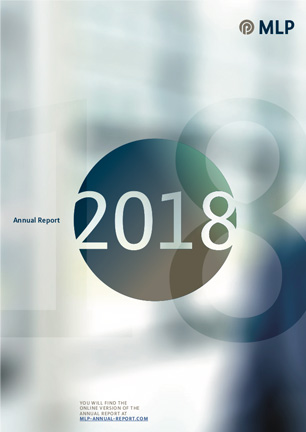ECONOMIC REPORT
Overall economic climate
Overall economic situation
The economy in the eurozone displayed weaker growth in the reporting year. In particular, the unfavourable external environment had a negative impact on dynamics. The ongoing international trade disputes with the US and the risk of a disorderly Brexit were perhaps the most important disruptive factors in this regard. According to estimates provided by FERI Investment Research, economic growth for the eurozone was 1.9% (2017: 2.3%).
German economic growth slowing down
The German economy also lost some of its growth dynamics in 2018. Just like the rest of the eurozone, Germany's economy was negatively impacted by the unfavourable framework conditions for foreign trade, while domestic demand remained robust. This was primarily bolstered by positive employment market developments, which led to notable increases in wages and salaries. According to calculations performed by FERI, inflation-adjusted gross domestic product (GDP) in Germany was only 1.5% in 2018.
Consumer sentiment of German citizens dampened slightly
Towards the end of the reporting year, the weak economic phase also affected consumer sentiment in Germany. As a result of this, the Consumer Sentiment Index of the German Consumer Research Association (GfK) declined slightly to 10.4 points in December 2018 – descending from its soaring level (previous year: 10.7 points). The sentiment among German company bosses also displayed similar development. The ifo Business Climate Index declined to 102.0 points in November 2018 – from a level of 105.1 points in January 2018. It continued to fall to a level of 101.0 points in December.
Ongoing recovery on the employment market
The upward trend in the German employment market continued. According to data published by Germany's Federal Employment Agency, the annual average number of registered jobseekers fell by 193,000 year-on-year to approximately 2.24 million in 2018. This corresponds to an unemployment rate of 5.2% (2017: 5.7%), which marks the lowest level since German reunification.
According to estimates provided by the Institute for Employment Research of the German Federal Employment Agency (IAB), the number of those in gainful employment displayed a year-on-year average increase of 600,000 in 2018 – to just under 45 million. This increase is primarily based on an increase in jobs subject to compulsory social security contributions.
The prospects for university graduates in particular remained excellent in the German employment market. According to the latest data from Germany's Federal Employment Agency, the unemployment rate among academics remains at a very low level of just 2.3%.
Increasing salaries and wages
The economic situation of private households in Germany remained good. According to data published by the Working Group on Tax Revenue Projection, gross wages and salaries increased by 4.7% in the reporting year, while the disposable income of private households increased by 3.6% according to the 2019 Financial Report of the German government. The savings rate in Germany increased slightly in the last financial year, reaching 10.3% (2017: 9.9%).

